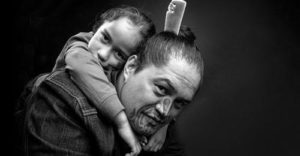1830s: Maori Children are Stuffed
March 9, 2021
By AHNZ
 If you have a good family, a good father, you don’t need to invent one. No need to look for a fantasy hero father in a fictional film or comic. No need to pretend the father you have is good by a special act of imagination. No need to scour the past, to exhume examples like fossils of an extinct species. Especially, there’s no need to make up lies about pre-Colonial superdads.
If you have a good family, a good father, you don’t need to invent one. No need to look for a fantasy hero father in a fictional film or comic. No need to pretend the father you have is good by a special act of imagination. No need to scour the past, to exhume examples like fossils of an extinct species. Especially, there’s no need to make up lies about pre-Colonial superdads.
So then, the article Just love: Māori dads is written by and especially for people who don’t know any loving Maori dads in real life. Michelle Duff, instead, invents one by a very selective reading of our history books.
“For hundreds of years, Māori men have been gentle, kind and involved fathers. They have wiped away tears and sung to their babies, as little hands cling to their necks. How and why have these stories been lost? Michelle Duff reports.”- Stuff (2021)
The short answer to this apparent discontinuity is that existing stories have not been lost then found again by the intrepid Duff. Non-existing stories have been invented or elided by a combination of force. For one, you don’t get funded or published for exposing the true and horrible stories about pre-Colonial Maori parenting. You get carbon credits and Feminist points and Maori column inches for scouring the literature for feel-good facts while passing over the contrary ones.
“In Māori culture, hair, like the head, is tapu, or sacred…Taupounamu cut some off. His mother was upset. Arapere, who is of Ngāti Raukawa, Ngāti Tūwharetoa and Ngāti Porou descent, took his son out into the garden, where they buried a lock of his hair in the backyard, and said a karakia…Arapere says. “When you are trying to raise your kids in an indigenous way, there are always breadcrumbs of how your ancestors did it too.”
Thus the mythical narrative of the “indigenous way” that involves Western funerals for follicles is born and passed off to us as if it were a continuity with “hundreds of years” of Maori fatherly practice. Actually this is some junk made up on the spot to control a child and pacify an angry woman. Or, where was the sacred childs’ head concept when Peter Buck was growing up…?
“A friend of mine, a little older than myself, was brought up by a grand-uncle who still though that chiefs should be trained to become successful military leaders. They slept in the same room in separate beds. In the early mornings, the old man went outside to satisfy certain needs. On his return, he slapped the still sleeping child and when back to bed muttering his disappointment. This went on for some time, until one memorable morning the now apprehensive child heard the old man leave the room. When he returned to slap the sleeper, the child gazed up at him with wide open eyes…this was as it should be, for no warrior must be caught napping.”- Ewing (1970)
Buck continues to specify other ways the Maori fathers slapped or beat their kids, always saying that it was for their own good and made them better people. If a child’s head were too tapu to strike from the 1870s to 1950s then an authentic authority such as Buck seems not to know of it. Nor, the grand-uncle whose authority on protocols would stretch back even earlier into the 1800s.
“Pre-colonisation, Māori lived by this celestial example. Society was not patriarchal, and men and women had complementary roles.”
This is simply absurd. The patriarchs were complemented by many wives, including a head-wife to keep the others in line. It wasn’t a nuclear family, it was polygamy. If one of the wives was not complementary to her protector she would be cast out! When visitors sailed to New Zealand shores it was the men who would pimp out the women and children.
“Or this, from the author Joel Polack a year later: “The New Zealand father is devotedly fond of his children, they are his pride, his boast, and peculiar delight; he generally bears the burden of carrying them continually within his mat.””
Here we have a case of Polack’s 1840 book being scrubbed and sanitised for feel-good quotes by a 2011 professor’s review, then this in turn mined further to leave behind all feel-bad context. What we have left is what makes it into the Duff Stuff article. A polished gem of lies which people then read and share and tell one another is their history. The full quote comes from Jenkins thesis of 2011 and reads..
“Child prisoners were greatly prized and lived with the whanau but they remained slaves for life. “The father was devotedly fond of his children and they were his pride and delight..”- Jenkins (2011)
From the origional text: “The New Zealand father is devotedly fond of his children, they are his pride, his boast, and peculiar delight; he generally bears the burden of carrying them continually within his mat, whose rugged texture must be very annoying to the tender infant. “- “New Zealand : being a narrative of travels and adventures during a residence in that country between the years 1831 and 1837, Joel Polack; Archive.org
Stuffed Children
“…respectable chief, named Te Kuri, whose residence is at Turunga, or Poverty Bay, had a fine boy born to him, who died in his fourth year. Poor Kuri was almost inconsolable, until he hit upon a method, in fashion among his countrymen, to preserve the best memento possible of the lamented child. He eviscerated the body and head, and cooked the whole in the same manner the head of an enemy is preserved, stuffing the inside of the body with scraped flax ; and at a distance it was impossible to perceive the difference between it and a living child. I had often seen Kuri carrying this apology for an infant in his blanket behind his back, and re-marked one day what a pleasing and remarkably quiet child it appeared. This observation elicited a laugh, in which this candidate for paternity heartily joined. The body had been stuffed in the state I saw it at least five years.”
“At Tokomaru, another chief, about forty years of age, lost two children ; his immoderate fondness for them had caused him also to stuff those bodies in a similar manner ; giving them, like Kuri, an airing now and then in the sun and air, as a preservative against damp.”- ibid
“This is how we should all father our kids, not just Māori men but all men. With love, compassion and pride, they are our legacy”
“And what evidence do you have on these thoughts bro? What have you read that backs your theory up? Or did you just make something up in your mind that suited what you would like to believe and then ran with it? Read the article because I read a lot of book from past New Zealand, mainly written by the first white settlers and missionaries and Im sorry to tell you but they also speak of this great love of Māori fathers to their children, nieces, nephew, grand children etc. If you even read the article I quote; “The New Zealand (Māori) father is devotedly fond of his children, they are his pride, his boast, and perculiar delight…” Writer Joe Polack, 1840. So your truth is not truth sorry mate, its just made up. Māori parenting was much better uncolonized, fact. Maybe your ancestors parenting was worst in the past but not mine. Read it up, don’t make it up.” – Wake N Renee Matthews, Facebook (March 2021) (public)
 People are believing and sharing Duff’s Stuff and are so invested that they get upset when contradicted by the primary sources.
People are believing and sharing Duff’s Stuff and are so invested that they get upset when contradicted by the primary sources.
In reality there’s a chain of abuse going back from the present day Once were Warriors generation to Peter Buck condoning it, to his grand-parents in the 1870s, and on back to their own childhood witnessed and recorded in the 1830s by Polack.
If there’s one advantage the non-Maori New Zealander has in being a parent it’s that he’s not blinded by Political Correctness. If he has problems and is doing a bad job there’s no Michelle Duff out there slipping him opiates and distractions so as not to care. When something’s on fire you need the fire department but if someone says “Don’t call for help, I’ve got this,” they do great damage by putting the alarm bells on mute.
—
1 Nia Glassie and child abuse; Stuff (2009)
Ref. Introduction to Maori Education, John Ewing (1970)
Ref. also “He slept in the same room as his mentor, who taught him through discipline the value of moving fast and remaining alert.”- teara.govt.nz (leaving out the details about this abusive ‘alertness’ training. Again, only ‘nice’ history about Maoris may be repeated.)
Ref. Maori: “…gentle, kind and involved fathers”, Lindsay Mitchell
Image ref. “Stuff’s ethical reporting is built on accuracy, fairness and balance.” – the text under every Stuff article asking for donations.
2 thoughts on "1830s: Maori Children are Stuffed"
Leave a Reply
 Like Comment Share
Like Comment Share






Sorry, where is the pre-colonial proof of your argument? (in terms of child abuse?).. the years I see here are post-colonial are they not?..
Also, you may see the preservation of the children as abuse but that’s because it’s not your culture. Our people were very comfortable with the preservation of dead bodies. Once someone had died, we know they feel no more pain.. so I’m not sure what your point is there, are you saying because you don’t understand it, then it has to be abuse..?.. far different from how we deal with loss these days, but I see love in those two stories.
Now I’m not saying I agree with the all-good no bad narrative, I disagree with it too. No human should be made out to have no flaws, no large collective should be made out to have no bad apples.
I see what you are saying in terms of stories being half told. I understand that, but your views are extreme on the matter as well. You will find bad people in all cultures and societies, and you will find their law/lore being broken. Did child abuse happen pre-colonial, yes it did, but at the scale it does now after the impression colonization made?.. definitely not.
You should research the practice of muru and its implications for child abuse in pre-colonial times. Maaori had it well established in the main pillars of lore that the abuse or neglect of a child carried some of the harshest penalties. Western law came and implemented the normalization of smacking children, Maaori didn’t have that societal norm previously, Maaori also weren’t afflicted by low socioeconomics, which inflicts the majority now, adding to what is behind the statistics of child abuse by Maaori as we know it today. Here you are making it, only about race. Please come to an argument like this with comparisons of statistics in pre-colonial and post-colonial times, you need to show that the child abuse we know of now on Maaori children is at the same rate in society as it was pre-colonial.. if your argument is stating that it is how we are and always have been as a race of people.. this doesn’t evidence that. If you can find enough pre-colonial cases to support your argument then your argument may fly but at the moment you are picking a phew situations, (the only ones of child abuse that I can see here are postcolonial) and using it to present an argument that explains the ways of Maaori in general, without other factors such as colonial influence. It’s a racist view, its manipulative and you are calling the kettle black! it doesn’t stack up I’m sorry.
Thanks for commenting. “Sorry, where is the pre-colonial proof of your argument?” You’ll see various quotes that date from the 1830s of a generation even older. Or…what do you consider the pre-colonial time period?
“you may see the preservation of the children as abuse but that’s because it’s not your culture.”
Rape Culture or Abuse Culture is still culture. It’s not mine. But it remains abusive no matter whose it is. There’s no need to defend the indefensible. These things are not a matter of perspective.
“Once someone had died, we know they feel no more pain..”
What’s your evidence for that? Maoris and every other primitive person did not see pain and death that way at all. Dead people can haunt you and be maimed and in pain. Measures must be taken. You can keep hurting them and shaming them in the afterlife and Maoris practised that.
“I see love in those two stories.”
You’re bending over backwards. It’s not even a form of grief because the father was joking and laughing about his stuffed children.
“”Did child abuse happen pre-colonial, yes it did, but at the scale it does now after the impression colonization made?.. definitely not.”
Because Western culture has made the abuse socially unacceptable. Or made a good start in that direction.
“You should research the practice of muru and its implications for child abuse in pre-colonial times.”
If that helps your case then you should research it and use it in conversations like this..
“Maaori also weren’t afflicted by low socioeconomics”
Maori lived as peasants, or the slaves of peasants. It was a strict dominance hierarchy society that lived in great poverty in absolute terms compared to our lowest today.
“if your argument is stating that it is how we are and always have been as a race”
Why speculate? You can read my argument without making stuff up or taking a guess.
” If you can find enough pre-colonial cases to support your argument then your argument may fly”
Address the ones I have made and if you need more I can present them. I have more to draw on but what’s the use if you skip over the above? It’s as if you think that by siding with these abusers in the olden days you can save their reputations or something. The thing to do is to repudiate their abusive ways and move forward. When we know better we do better.